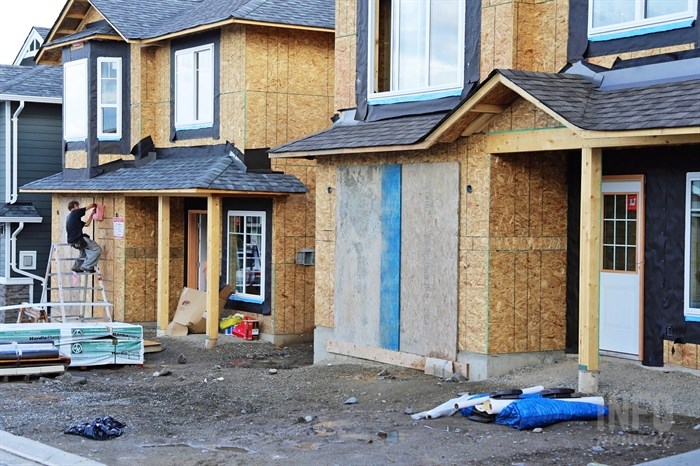
(JENNIFER STAHN / iNFOnews.ca)
December 05, 2018 - 5:30 PM
KELOWNA - Cities in B.C. should not bow to peer pressure by forcing the new B.C. Energy Step Code on homebuilders, says the head of a Central Okanagan construction association.
“One of the things that’s very challenging for cities is, our provincial government creates a peer pressure environment,” Les Bellamy, president of the Central Okanagan chapter of the Canadian Home Builders’ Association, told iNFOnews.ca.
“All the cities are trying to outdo each other and be able to tell everybody that they’re doing the best thing for the environment,” he said. “When it comes to climate change and the Step Code, municipalities are under pressure to wave the flag and say, look at us, we’re doing great things. Our fear is that peer pressure can outweigh the responsible decision of ensuring that we’re not destroying housing affordability.”
The Energy Step Code has five levels of energy efficiency. The highest, Step 5, envisions a newly built home capable of being 100% energy neutral, a goal the province has set for all new homes by 2032.
In promoting the Step Code, the government used a B.C. Housing study to show the costs for the lower steps were often less than one per cent of total construction costs.
Bellamy’s association disputed that claim and did their own study based on the actual cost of construction and found it could cost tens of thousands more to comply with the code and take homeowners 50 to 60 years to recoup those costs through energy savings.
For the same price, existing homes could be renovated to save more energy and recoup the investment faster, he said, noting that new homes make up only one per cent of the housing stock so far bigger energy savings could be achieved through renovations.
He said an energy efficiency tax credit could actually be revenue neutral for the province.
While the Step Code is currently voluntary, the province has given municipalities the power to make it mandatory.
The City of Kelowna did consider doing just that but the homebuilders association convinced council to defer that decision until it could do its own study.
The Central Okanagan study used actual housing designs and material costs that show that compliance to the Step Code could add as much as five per cent in construction costs.
A small home that costs $464,000 to build, if it followed the code, would have to add about $11,400 just to get to Step 1 with no energy savings, according to the homebuilders study.
Getting to Step 3 – with a 20 per cent energy reduction - would add another $5,000 to $13,000 to that base cost. Depending on design, that means it could as much as $24,000 more to build a small house.
Getting to Step 5 could add as much as $42,000, again according to the homebuilders study.
Two of the biggest factors in making a home more energy efficient is to have it facing south and minimize air flow, Bellamy said.
Neither of those factors apply to older homes but more energy efficient windows, furnaces and hot water tanks can make a huge difference.
The target for energy conservation should be homes built to different standards before 1990, Bellamy said. Those account for 60 per cent of the housing stock and use twice the energy as homes build today.
The other 39 per cent of homes, built between 1990 and 2012, use 60 per cent more energy than ones built today.
While B.C. wants to have only zero emission homes built by 2032, Bellamy argues that cities shouldn’t require such stringent rules now. Instead, the industry needs time to research more cost effective ways to achieve that goal.
“We would encourage them to recognize that the housing market cannot take further cost increases and lock out the next generation of home owners,” he said
To contact a reporter for this story, email Rob Munro or call 250-808-0143 or email the editor. You can also submit photos, videos or news tips to the newsroom and be entered to win a monthly prize draw.
We welcome your comments and opinions on our stories but play nice. We won't censor or delete comments unless they contain off-topic statements or links, unnecessary vulgarity, false facts, spam or obviously fake profiles. If you have any concerns about what you see in comments, email the editor in the link above.
News from © iNFOnews, 2018